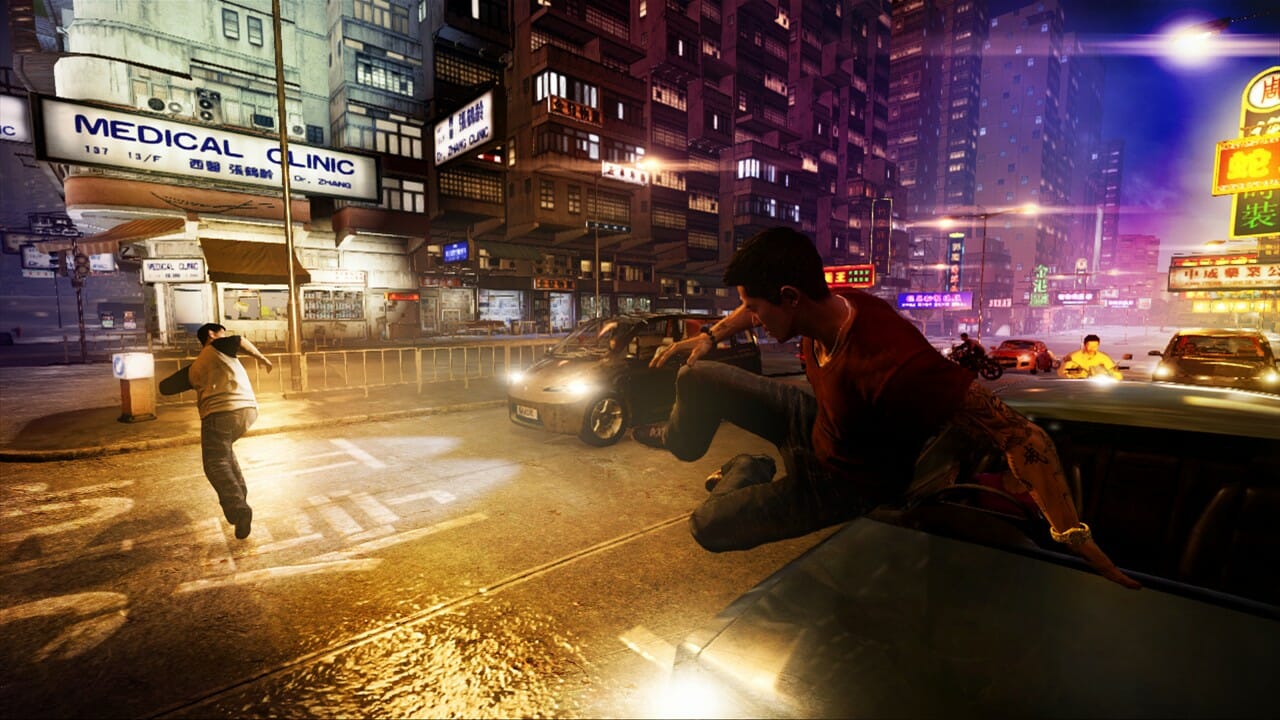Sleeping Dogs (Multi-Platform)

By now, it’s a pretty straightforward formula: Take a famous location, find a few violent movies that were set there, and use the resulting aesthetic as the basis for an “open-world action game.” (A term invented because it would be untoward to use the phrase “Grand Theft Auto 3 clone” in a press release.) As unlikely as it sounds, until now there had yet to be an “open-world action game” with a Hong Kong/early-John Woo motif. Sleeping Dogs capably fills that void, albeit without much gusto or practically any of the soul exhibited in the games or films that inspired it.
Sleeping Dogs tells the story of Wei Shan, an undercover cop trying to bring down the Sun On Yee, an organized crime syndicate. Like every undercover cop ever profiled in a work of fiction, Wei Shan grows attached to the people he’s trying to prosecute, and eventually feels torn between the badge and staying true to the game. For a man so divided, Wei Shan’s day-to-day life is surprisingly simple, consisting entirely of driving around a fictionalized version of Hong Kong and committing crimes. The range of crimes available to Wei Shan is surprisingly wide, however: Within just a few hours of play I’d found myself participating in acts as diverse as cockfighting and insurance fraud.
Considering how they all seem to take place in a world where the statute of limitations on basically every crime is however long it takes for the police to give up on chasing you, it’s surprising that so many open-world crime games take themselves so seriously. Sleeping Dogs lacks that quality, and its willingness to take itself over the top works to its advantage: Major plot points are telegraphed far in advance. “Dragon Attack” by Queen is included in the soundtrack. Wei Shan can impale his enemies on arrays of upturned swordfish heads while wearing a panama hat and knockoff Wayfarers. These touches reveal Sleeping Dogs to be more self-aware than most games of its kind—and are one of the only things that set it apart from other games in its genre—but they don’t make up for its uninspired play and near-total lack of atmosphere.

There’s very little about Sleeping Dogs’ action that isn’t cribbed directly from another game. Its gravity-defying foot chases borrow heavily from Mirror’s Edge, its beat-up-everyone melee combat reeks heavily of the newer Batman games, and its slow-motion gunplay is straight out of Max Payne. Everything else can be found somewhere in the GTA playbook. Sleeping Dogs’ cover versions tend to be about half as good as the originals, but at least its designers had good taste. (Side Note: It’s interesting that Max Payne’s bullet time effect is an homage to the Asian gangster movies that Sleeping Dogs uses as a stylistic bedrock. There might be a case, then, that Sleeping Dogs is more deserving of the John Woo rip-off effect, but its version of bullet time is clunky and difficult to use, so it’s a moot point.) For an entry in a genre that depends so heavily on atmospherics, variety and detail, Sleeping Dogs feels focus-grouped and rote.
For all its fourth wall-breaking sheen and nods to superior games, a surprising amount of Sleeping Dogs falls apart under scrutiny. Its main characters are voiced by the likes of Emma Stone, Lucy Liu and Tom Wilkinson, but the rest of Sleeping Dogs’ voice acting is so poor that I’d believe anyone who told me that these ancillary characters were the product of a text-to-speech program. After patronizing a “massage parlor,” I was forced to hear the female employee say “I tell all my customers they’re amazing, but this time I mean it” in a voice that sounded like a scared robot. The result was unsettling enough to completely negate the creepy joke the game was trying to make about Hong Kong’s sex trade.